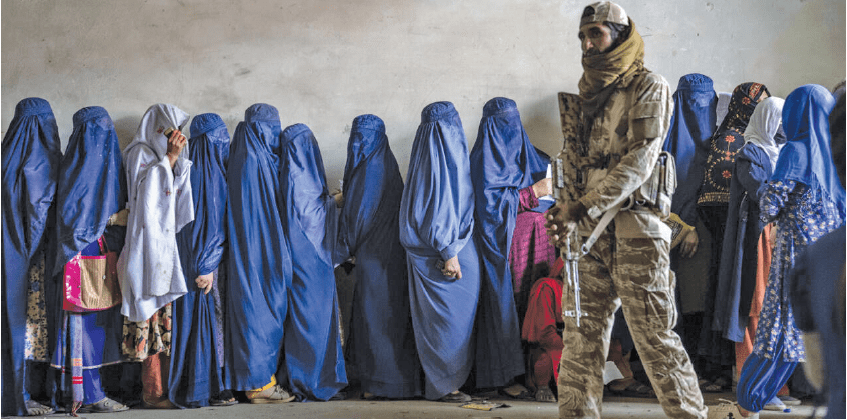The Afghan government recently announced a controversial law named ‘Promotion of Virtue and Prevention of Vice’, which empowers the moral police to severely restrict the personal freedoms of Afghan citizens. This draconian law prohibits activities such as singing, socialising, using gadgets like smartphones, and even talking freely in many circumstances. While the law affects the entire population, its harshest impact is reserved for women.
Under this oppressive legislation, women are forbidden from singing songs or reciting poetry, forced to travel only with a mehram (a male guardian), and barred from obtaining higher education. These restrictions strip Afghan women of their fundamental human rights, erasing decades of progress and plunging society into regressive darkness. Once a country that stood as a beacon of progressivism and equality in the 1960s, Afghanistan now finds itself in the grip of an extremist agenda, engineered by capitalist forces that destroyed its potential for a socialist, democratic future.
In the 1960s and 1970s, Afghanistan was a progressive nation with women playing prominent roles in education, politics, and culture. Women studied in universities, worked in professional sectors, and had the freedom to dress, travel, and express themselves as they pleased. This golden era was a result of the pro-people policies introduced by Afghanistan’s socialist-leaning government, which sought to modernise the country and dismantle feudal structures.
However, this progress became a target for capitalist forces during the Cold War. The U.S., in its bid to defeat the Soviet Union, funneled billions of dollars to arm and empower the mujahideen, many of whom were deeply conservative and opposed to women’s rights. These actions directly undermined Afghanistan’s socialist government and paved the way for the Taliban’s rise to power in the 1990s.
The United States, which today claims to champion women’s rights and gender equality, played a pivotal role in creating the conditions that led to the Taliban’s dominance. By funding and arming radical groups to fight communism, the U.S. knowingly sacrificed the progressive aspirations of the Afghan people. Women, who were integral to Afghanistan’s socialist movement, became the first casualties of this betrayal.
As Sibte Hassan, a renowned communist writer, aptly observed, ‘Capitalists and oppressors go against their own laws when it suits their interests.’ America’s intervention in Afghanistan is a glaring example of this hypocrisy. While promoting liberal values at home, the U.S. supported fundamentalist forces abroad to serve its imperialist ambitions, turning a blind eye to the devastating consequences for Afghan women.
The Taliban’s new law is riddled with contradictions. On the one hand, it bans women from public life and enforces rigid, patriarchal norms. On the other hand, the Taliban seeks international recognition and financial aid, which requires working with non-Muslim governments and organisations. This hypocrisy underscores the fragility of their extremist ideology, which, like all fascist systems, is inherently unsustainable.
History offers countless examples of the ultimate failure of fascism. Adolf Hitler, for instance, tried to enforce a ‘superior belief system’ by oppressing minorities and waging war, only to face widespread resistance and eventual defeat. The Taliban’s oppressive system, which denies women basic human rights such as education, free speech, and the freedom to marry by choice, is bound to face similar resistance.
The silence of the international community in the face of these atrocities is deeply troubling. Women in Afghanistan are not just fighting for their rights; they are fighting for the soul of their nation. If the world turns a blind eye to their plight, it risks normalising the oppression of women under the guise of religion and tradition.
In Pakistan, we see the dangerous spillover effects of this fundamentalist project. Blasphemy allegations are increasingly being weaponised to suppress dissent and justify violence. The same forces that seek to silence Afghan women today could threaten human rights across the region tomorrow.
The plight of Afghan women demands urgent attention and solidarity. Activists, feminists, and human rights organisations worldwide must raise their voices against this draconian law. Governments must hold the Afghan Taliban accountable and ensure that any engagement with Afghanistan is conditional on the protection of women’s rights.
Moreover, we must challenge the systems of power that allow such oppression to thrive. The capitalist forces that prioritise profits and geopolitical gains over human rights must be confronted. Only by addressing these root causes can we hope to build a world where women in Afghanistan – and everywhere – can live with dignity, freedom, and equality.
The Afghan women fighting against this new law are not just resisting tyranny; they are writing the next chapter in the global fight for justice. Let us stand with them and ensure their voices are heard.
The writer is a student rights activist and journalist.




1 Comment
Your comment is awaiting moderation.
Your point of view caught my eye and was very interesting. Thanks. I have a question for you.
Your comment is awaiting moderation.
I don’t think the title of your article matches the content lol. Just kidding, mainly because I had some doubts after reading the article.
Your comment is awaiting moderation.
https://t.me/s/iGaming_live/4867
Your comment is awaiting moderation.
https://t.me/s/officials_pokerdom/3590
Your comment is awaiting moderation.
Can you be more specific about the content of your article? After reading it, I still have some doubts. Hope you can help me.
Your comment is awaiting moderation.
**mind vault**
mind vault is a premium cognitive support formula created for adults 45+. It’s thoughtfully designed to help maintain clear thinking
Thank you for your sharing. I am worried that I lack creative ideas. It is your article that makes me full of hope. Thank you. But, I have a question, can you help me?
Your comment is awaiting moderation.
Your point of view caught my eye and was very interesting. Thanks. I have a question for you.